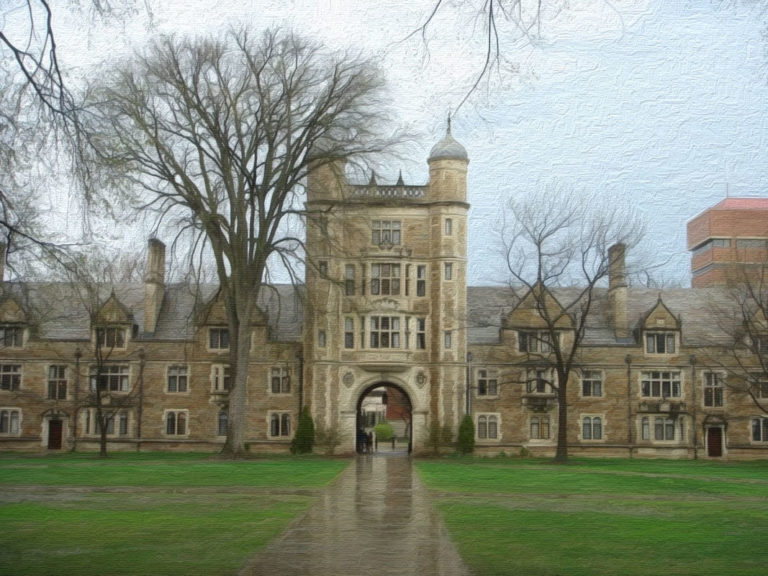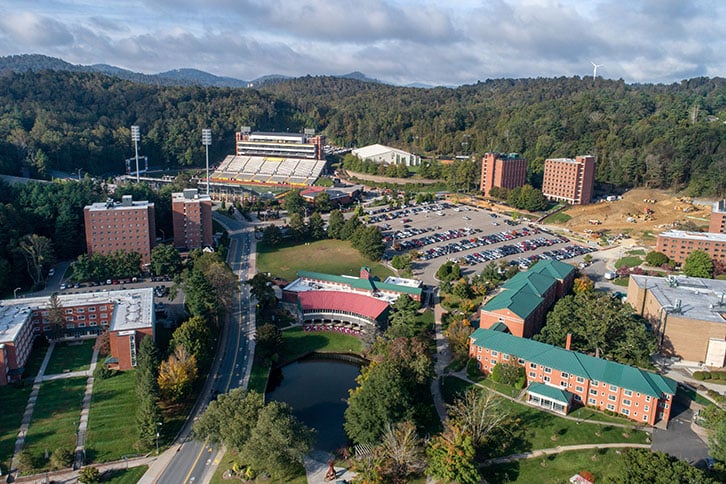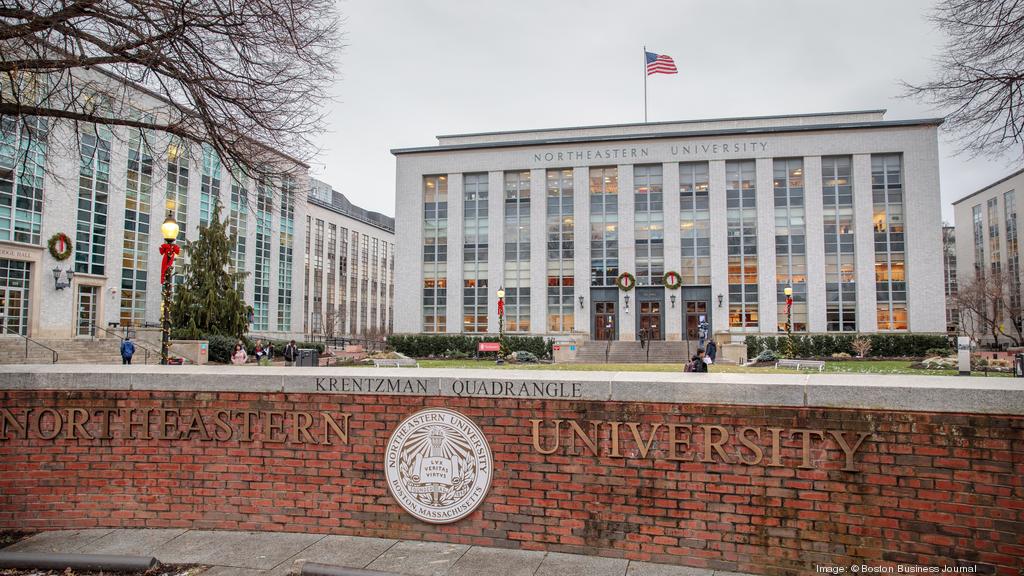We have ranked the best Sustainable and Renewable Energy colleges in the U.S. This ranking of renewable energy degrees is designed for students.
This ranking is designed to present college and degree information for anyone wanting to study renewable and sustainable energy for undergraduate and graduate programs.
We use data from the National Center for Education Statistics, and academic prestige and influence in our ranking metrics.
The need to efficiently use the resources that our environment affords is vital for the future. This includes learning new techniques to implement sustainable energy technologies. The sustainable and renewable energy industry is a growing field of study with a bright future in the energy sector.
According to the Bureau of Labor Statistics, a green job is a job that "produces goods or provides services that benefit the environment or conserve natural resources". Careers in Wind Energy, Solar Power, or Green Construction fall into this category.
Renewable energy degrees can be programs within science or business departments. Business administration program options focus on environmental management or engineering management, whereas science programs focus on renewable energy technology and renewable energy systems.
Students learn alternative energy technologies in the energy sector, such as wind energy using wind power, solar power, for the sake of optimizing energy efficiency and generating sustainable power.
The renewable energy field is actively engaged in energy science, energy storage, energy economics, and alternative energy technologies.
Environmental Science is in our ranking of the 20 Best Online Degrees for Careers, which is based on the highest potential salaries from online bachelor's degrees.
Schools may download our badge.
The Best Sustainable and Renewable Energy Degrees
Pennsylvania State University-World Campus
University Park, Pennsylvania

With over 100 years of experience providing distance education, the online programs through Penn State World Campus have the reputation of being as dynamic and beneficial as any on campus class.
The online Bachelor of Arts degree in Energy and Sustainability Policy program is no exception. The comprehensive curriculum, designed by an advisory board of energy industry experts and Penn State faculty members, requires a total of 120 credits for graduation.
The credit break down includes 68 for the major, 24 for the bachelor of arts, 45 for general education (25 of which are included in the requirements for the major), and eight for electives.
Major course topics include Energy Conservation for Environmental Protection, Oil: International Revolution, Energy and Sustainability in Contemporary Culture, and Human Dimensions of Global Warming.
The Sloan Consortium recognized the Bachelor of Arts in Energy and Sustainability Policy as the Outstanding Online Program.
University of California-Berkeley
Berkeley, California

At Berkeley, the oldest of the ten University of California schools, the Bachelor of Arts in Sustainable Environmental Design is offered through the College of Environmental Design. This interdisciplinary program prepares students to face the sustainability challenges not only of urban California, but also on a more globally minded level.
Through expert teaching students will gain the understanding of urban technologies and design strategies, be able to evaluate the current state and future potential of an area or situation, and then apply physical, biological, and social science in the design of sustainable cities.
Additionally available as a minor, some of the class requirements of the program include Critical Debates in Sustainable Urbanism, Geographic Information Systems, and Environmental Design for Sustainable Development.
The final Capstone workshop before graduation expects students to apply classroom theories to real scenarios, working in conjunction with an external client organization. Students must complete a total of 120 units before graduation.
Southern New Hampshire University
Manchester, New Hampshire

SNHU also offers the online Bachelor of Arts in Anthropology: Environmental Sustainability degree. This degree takes a unique approach to sustainability studies by looking at anthropology, and what role human nature plays in sustainability.
This online degree program is in Anthropology with concentration in Environmental Sustainability. The course is six 9-week terms per year, and is 120 total credits, 30 of which are electives.
Southern New Hampshire's online MBA in Sustainability can be completed in just over one year. This program combines the traditional MBA classes with specialized courses covering ecological and energy-related challenges in order to prepare students to tackle current environmental issues with practical and efficient solutions.
Class topics may include Government Impact on Business, Human Behavior in Organizations, and Energy and Society.
The degree concludes with a cumulative capstone course where students apply theories and integrate ideas into real-life scenarios.
Arizona State University
Scottsdale, Arizona

Arizona State University (ASU) offers an online BS in Sustainability, and an online BA in Business Sustainability.
The BS in Business Sustainability teaches graduates to enter the workforce and ensure that businesses are in keeping with sustainable practices.
Courses include:
- The Economics of Sustanability
- Principles of Management and Leadership
- Business and Sustainability I
- Business and Sustainability II
- Sustainable World
Credits: 120, with a 50 credit minimum in the upper level major courses
The online Bachelor of Science in Sustainability is interdisciplinary. Students choose one of these three emphases:
- Sustainable energy, materials and technology
- Sustainable ecosystems
- Economics of sustainability
This degree program teaches graduates how to work in keeping the environment sustainable, for the sake of the community, economy, and ecosystems.
Courses include:
- Future Thinking and Strategies
- Sustainable World
- Systems, Dynamics, and Sustainability
- Calculus and Probability for the Life and Social Sciences
- Careers in Sustainability
Two capstones and required: a workshop and an internship.
Credits: 120
The College of Global Futures offers this online degree.
University of Maryland-College Park
College Park, Maryland

With the experience of serving more than 37,000 students, the University of Maryland prides itself on the quality curriculum of each program.
Being the largest institution for higher education in the state, there are more than 100 undergraduate majors and over 120 graduate programs available.
The James Clark School of Engineering, Office of Advanced Engineering Education provides students with the opportunity to participate in the Master of Sustainable Energy program.
A total of 30 credits are required to complete this degree. There are five core courses and five technical electives. Four of the electives should be from the Energy Systems courses or the Reliability Engineering courses.
Class topics include Wind Energy Engineering, Sustainable Energy Conversion and the Environment, and Solar Thermal Energy Systems.
For students unable to participate in the full Master's degree, a graduate Certificate in Sustainable Energy is also available, requiring only 12 credits for completion.
University of Michigan-Ann Arbor
Ann Arbor, Michigan

The Energy Institute at UM offers the Master of Engineering and Energy Systems, and the Master of Engineering Sustainable Systems.
The Master of Engineering and Energy Systems is the first in the nation, and is designed to teach engineers to handle changing energy needs on a global scale.
This degree teaches engineering of energy systems, which involves using technology to supply energy needs.
This 30 hour Master's degree is interdisciplinary, and includes courses in business, engineering, natural and social sciences, environmental science, and public policy. This Master's degree is available on campus and online.
The Master of Engineering Sustainable Systems is a dual degree, which confers a Master of Science degree from the School of Natural Resources and Environment, and a Master of Science in Engineering from the College of Engineering.
This program offers three specializations: Sustainable Water Systems, Sustainable Energy Systems, and Sustainable Design & Manufacturing Systems.
This dual degree requires 54 credits, and incorporates the Master of Science in Engineering program with the Master of Science program.
Colorado Technical University-Colorado Springs
Colorado Springs, Colorado

Offering a variety of degree programs, from Bachelor through Doctorate, Colorado Tech's Doctor of Management in Environmental and Social Sustainability (Executive Format) offers students a deeper understanding of energy conservation, will prepare students to predict future trends in sustainability, and will provide students with the credentials to guide organizational policy in an environmentally-friendly direction.
The program requires 96 total credits which include ten core instructional courses, five concentration instructional courses, and nine doctoral research courses.
Class topics may include:
- System Thinking and Transformative Social Systems in Sustainability
- Trans-Organizational Policy and Governance Related to Sustainability
- Current Topics in Environmental and Social Sustainability
Liberty University
Lynchburg, Virginia

The Bachelor of Science in Business Administration: Green and Sustainable Management degree requires 120 hours total, which include 30 hours of upper level courses.
Courses include:
- Environment and Sustainability
- Energy Resources and Efficiency
- Environmental Science and Policy
In addition to business courses, these renewable energy courses teach managing environmental resources in order to navigate the sustainability challenges in today's business world.
Appalachian State University
Boone, North Carolina

The Sustainable Development Department offers four programs: a Bachelor of Arts, a Bachelor of Science, an undergraduate minor, or a concentration. To complete the Bachelor of Arts degree in Sustainable Development, students must take a total of 122 credits, including 44 for General Education, 6-12 for Languages/Literature and Cultures, and 45-46 for the major.
ASU also manages the Department of Sustainable Technology and the Built Environment. Students are exposed to a comprehensive array of sustainable energy technologies as they apply to construction and building science.
University of Wisconsin-Madison
Madison, Wisconsin

The University of Wisconsin offers the Sustainable Management Bachelor's, Master's, and Certificate degrees.
These degree program options combine instruction in business, the natural sciences, and social systems, to train sustainable-minded managers. The degrees are taken entirely online, with flexible course schedules, making them manageable for the working adult.
The Bachelor of Science in Sustainable Management is a 21 course, 63 credit renewable energy degree. This is an interdisciplinary degree, and includes courses such as Systems Thinking, Environmental Science and Sustainability, and Triple Bottom Line Accounting for Managers.
This degree has no electives, and includes a hands-on capstone course solving a real-world sustainability problem with an existing organization, preparing graduates for renewable energy jobs.
The Master of Science in Sustainable Management is a 12 course, 34 credit degree program. The program includes core classes, a specialty track, and a capstone experience. Core Classes include Cultural and Historical Foundations of Sustainability, The Natural Environment, Economics of Sustainability, and The Built Environment. This degree is also interdisciplinary.
The Sustainable Enterprise Management Certificate is a five course, 15 credit degree. There are six courses available, but students choose only five. The four required courses are Triple Bottom Line Accounting for Managers, Economics in Society and Sustainability, Sustainable Organizational Finance, International Management for a Sustainable World.
Students will choose one of these two courses: Management and Environmental Information Systems, and Operations Management and Sustainability.
These Certificate programs consist of courses from the Bachelor of Science in Sustainable Management degree. Courses taken in these Certificates will go towards the Bachelor's in Sustainable Management.
University of Massachusetts-Lowell
Lowell, Massachusetts

The Renewable Energy Engineering Program (REEP) offers Master's and Doctoral degrees, a Graduate Certificate, and an undergrad minor in Energy Engineering. This Renewable Energy Engineering Program focuses on renewable energy sources such as green combustion, solar energy, fuel cells, and wind turbines.
The Master's in Renewable Energy Engineering has three tracks from which to choose: Thesis, Project, and Course Only. Each track requires 30 credits to graduate. Courses include Energy Engineering Workshop, Fundamentals of Solar Utilization, Transfer Processes in Energy Systems, and Alternative Energy Systems. Students will defend their thesis in an oral examination.
The PhD's renewable energy (solar) concentration is through the Mechanical Engineering Department. This degree is 63 credit hours, culminating in a dissertation. A Master's degree in engineering (or equivalent) is required to be accepted to the program. 12 credits in the core classes must be taken.
Core courses include Power Electronics, Alternative Energy Systems, Energy Systems Design Workshop, and Solar Engineering Fundamentals.
The PhD student must be in full time residency at the university for a year minimum.
The Certificate is 12 credits, and is an interdisciplinary graduate degree focusing on research, design, development and manufacturing of renewable energy systems.
Northeastern University
Boston, Massachusetts

The Master of Science in Energy Systems program at Northeastern University's College of Engineering can be taken completely online, or completely on campus. This Master's degree requires 35.5 credit hours for graduation.
The focus of this degree is on public planning, technical principles, and business strategies. Most students complete this course in 2.5 to 3.5 years.
This Master's degree is suitable to those students who have either a business or engineering undergrad degree. It is an interdisciplinary approach to education in sustainable and renewable energy, incorporating business, engineering, and financial planning.
This Master's can be combined with the Gordon Engineering Leadership Certificate. There is also a co-op opportunity for students, which can be used to offset tuition costs.
Santa Clara University
Santa Clara, California

Santa Clara University offers two tracks within the Sustainable Energy Program, the Renewable Energy Graduate Certificate or the Master of Science degree.
Both programs require students to have an undergraduate degree within the field of Engineering from an accredited school.
The Certificate program offers a more introductory level to the field with a minimal requirement of 17 quarter units. Nine of these units are in Power Systems, four units are in Renewable Energy, with the remaining four units in Sustainability. Class topics include: Introduction to the Smart Grid, Photovoltaic Devices and Systems, and Sustainable Energy and Ethics.
For the full Master of Science degree, students will complete a total of 45 units, with up to 12 units for electives. Classes include Energy Conservation, Power Electronics, Energy-Efficient Computing, and Sustainable Structural Engineering.
The academic adviser for both programs is Dr. Samiha Mourad who works with students to develop a Sustainable Energy Program of Studies.
North Carolina State University at Raleigh
Raleigh, North Carolina

The Clean Energy Center at North Carolina State University offers the Renewable Energy Technologies Diploma Series. This Diploma is a continuing education program.
There are seven week-long, 40-hour workshops from which to choose, and students are required to complete three workshops for a Diploma (which is 120 hours of study total).
These workshops study subjects such as the Certificate in Renewable Energy Management, Fundamentals of Solar Thermal Systems Design and Installation, and Advanced Design and Installation of Photovoltaic Systems.
San Juan College
Farmington, New Mexico

San Juan College has one of the nation's earliest programs in renewable energy. The Associate of Applied Science Degree and/or a Certificate are offered in Photovoltaic or Solar Thermal Systems.
Both degrees have the same core courses, and both include electrical training in a lab, emphasizing the National Electrical Code. Analysis of Solar systems and their design is also covered.
The Certificate is ideal for students who already have a degree, and for those who already work in renewable energy. The Associate's degree adds general education courses to the core courses that are in the Certificate. The curriculum is offered in the semester format, and include hands-on courses such as PV Installation and the NEC I & II.
Massachusetts Institute of Technology
Cambridge, Massachusetts

MIT is a leader in innovation and technological advancement studies in the United States.
Under the Energy Initiative at MIT, the Energy Studies minor is an interdisciplinary program that studies energy across energy sciences, technology, and social sciences.
This program is ideal for students who are interested in learning about energy without needing a major in the subject.
Students will study courses within three core curriculum subjects: Science Foundations, Social Science Foundations, and Technology/Engineering in Context. 24 Elective units are required.
Oregon Institute of Technology
Klamath Falls, Oregon

Part of the Oregon Tech experience is the Oregon Renewable Energy Center. The focus of the Center is to accelerate the acceptance of clean energy technology and to integrate renewable energy resources with current power systems.
The Center works closely with industries both locally and throughout the state in an effort to advance these green practices. Two major current projects for the Center are Wind Turbine Modeling and Hybrid Vehicle Controls.
Renewable energy industry careers
Careers in the renewable energy sector, also known as green energy, include renewable energy engineering, electrical engineering, solar thermal systems technician, wind turbines technician, energy and sustainability analyst, and environmental scientist, among others.
Environmental Sustainability careers earn an average of $112,000 in the U.S., according to Glassdoor.
Energy engineers make $93,151 per year, according to Indeed.com.
Ranking Methodology:
The schools and programs listed are on the cutting edge of education in renewable and sustainable energy. As usual at Successful Student, programs were ranked for students, and factored in the degree types (Certificates, Diplomas, Bachelor's, Master's, and Doctorates), the variety in the coursework, breadth of instruction in sustainable and renewable energy, and academic influence. See our College Calculator for more information about our methodology.
More resources:
- The Best Environmental Science Degree Programs
- Environmental Science Careers: A Guide for Students
- The 10 Best Biology Bachelor’s Degree Programs
- The 10 Best Graduate Biology Programs
- The Best Online Bachelor’s Programs in Anthropology
- The Best Philosophy of Science Degree Programs
- The Best Universities Solving Climate Change
- The 10 Most Influential Biologists in the U.S.
- The 10 Best Earth Sciences Graduate Programs
- The 10 Best Earth Sciences Undergraduate Programs
- The 10 Best Bachelor’s in Biomedical Engineering Programs
- The Best Online Agribusiness Programs
- The 14 Best Atmospheric Sciences and Meteorology Graduate Programs
- The Best Artificial Intelligence Colleges: AI Degrees and Certificates
